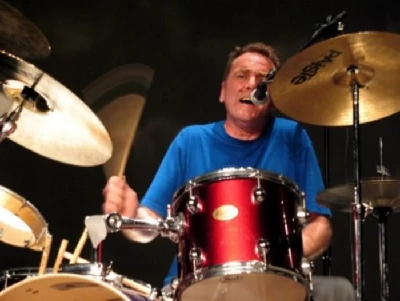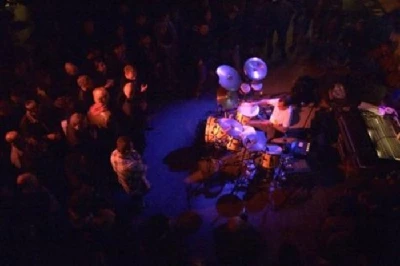published: 13 /
2 /
2010

Dominic Simpson at the Cafe Oto in London sees This Heat drummer Charles Hayward as part of a showcase for the Gravid Hands label accompanied by a saxophone and a bassist play an explosive free jazz set
Article
Open for the last few years in a side street next to the construction of the Chelsea-Hackney train line (due to be finished next year) in trendy Dalston, Café Oto has took over the mantel of the legendary Spitz venue in east London as a hub of all things musically liberal, left-field and non-mainstream. Non-sponsored by any commercial beer (in fact the only beer they serve is locally made ales) and serving Japanese food, and featuring an eclectic mix of experimental guitar squall, electronica, and free jazz, the venue has slowly took on a name for itself due to its individuality and non-compromising outlook.
As part of a showcase of sorts for the Gravid Hands label, it’s a perfect setting for Charles Hayward, who has remained one of London’s most underrated musicians since his formation of This Heat in 1975. Musically confrontational, abrasive and challenging, This Heat’s trio’s synthesis of post-punk, Krautrock, noise, musique concrète, tape manipulation, and unconventional instrumentation remains highly original to this day and must have seemed from another planet in the late 70s, especially when contrasted to the simplistic slogans and four-chord platitudes of their punk contemporaries. Hayward’s wild drumming and singing in that outfit would become his template sound, taking it with him once the band split to other outfits such as Camberwell Now, Massacre (with Bill Laswell), Gong, Crass, Blurt, and the Raincoats, all of whom he played with at some point.
His solo performances as of late have seen him sing and play an electrically rigged-up drum kit simultaneously, triggering samples with his drum sticks as he hits the snare drum and tom-toms. It’s an intense and breathtaking experience, and coupled with his virtuoso playing, has led to raptures from the audience at some of his performances that this writer has attended. Tonight, though, Hayward remains mostly mute of voice on his drum kit, uttering nothing except for the occasional banter with the audience.
First, though, we have Glockenspiel, a duo who choose to play at the other side of the room from the normal ‘stage’ (which isn’t really a normal raised stage at all, in keeping with the pure, ‘anti-rock’ feeling of Café Oto) - although this may be due to the fact that guitarist Adrian Dollemore is in crutches, and can access the venue exit easier. Sitting down, and with his guitar fed through numerous pedals, Dollemore produces a kaleidoscope of guitar wash, while former Quickspace drummer Steve Denton caresses his cymbals with a violin bow before locking into a beat. The set – one long, hazy and beautiful song – reaches an ecstatic finale, with the guitar washing like an all-surrounding psychedelic haze over the audience, the drummer perfectly locking in his beat in time; they finish to enraptured applause from the audience.
Leverton Fox are a less straightforward prospect by contrast, an improvised electronics, jazz trumpet and percussion trio that shift through processed sound backed up by wildly flailing drum lines and the processed trumpet sounds over the top of it all. With the drummer providing skittering and contorting rhythms to fit around the laptop’s burbling garbles of crackling electronic sound, clicks and scrapes, and the modulated tones of the trumpet, the trio’s music is characterised by the tension between the electronic and analogue elements present in the set.
In contrast, the night’s headliners – Hayward on drums, Tom Challenger on saxophone and Nick Doyne-Ditmas on bass (both acoustic upright and electric) – are mostly acoustic. Although they operate as a conventional jazz trio, their sporadic strays into wild free jazz territory lead to Challenger belting it out on his instrument so much that by the end he confesses to the audience that he’s too exhausted to do an encore. Hayward, meanwhile, forgoes his singing for simple expressive drumming, and looks happy to be here the whole time. Long may this idiosyncratic and criminally overlooked talent continue to shine.
Picture Gallery:-
